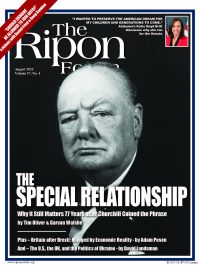“The so-called ‘golden era’ (in UK-China relations) is over, along with the naïve idea that trade would lead to social and political reform.”
— Rishi Sunak, British Prime Minister, November 29, 2022

Since 1949, the year Mao Zedong stood on the rostrum at Tiananmen and declared the founding of the People’s Republic of China (PRC), London has struggled with its relationship with Beijing. Then, and now, Britain strives to keep UK-China bilateral trade and other interests stable while attending to American security concerns.
Over time, a “tick tock” sort of dichotomy has developed, as bilateral relations swung from one extreme to another. The latest change saw the positive “golden era” of UK-China relations, heralded by former prime minister Theresa May in 2018, fall victim to what Mao Zedong might have dubbed “antagonistic contradictions” – the aggressive policies of Chinese Communist Party (CCP) secretary Xi Jinping.
A full description of Xi’s behavior rankling London would be too long to list here, but it includes the premature scrapping of “one country, two systems” for Hong Kong in violation of the Sino-British Joint Declaration of 1984; the repressive and transnational National Security Law foisted on that territory by the CCP; running three “police stations” on British soil; assaults on a BBC journalist in China and a peaceful demonstrator in Manchester; technology and trade secret theft; an influence scandal, and so on. Taken together, it seems like a program designed to outrage Britons, stimulate Parliament to implement trade and other restrictions, and push the UK into the arms of the Americans.
British interests in Asia from the 1950s until the 1997 return of Hong Kong made London useful as a partner to the CCP.
Past swings of the pendulum are illustrative. British interests in Asia from the 1950s until the 1997 return of Hong Kong made London useful as a partner to the CCP, posing occasional opportunities to subvert the UK-U.S. relationship. It was an uphill battle for Beijing, albeit with occasional victories. London allowed much bilateral trade during the U.S. embargo after the Korean War, and approved technology exports Washington would never have considered, such as the 1963 sale of Vickers turboprop aircraft and of Trident jets in 1971. But in the end, Beijing did not succeed in sabotaging the UK-U.S. “special relationship.”
The passage of decades has changed the landscape. After the 1997 Hong Kong handover, London was suddenly less important to Beijing, and popular Chinese thinking more easily shifted toward revenge for Britain’s key role in China’s “Century of Humiliation.” That 100-plus years after Britain’s 1842 military victory over China included British companies peddling opium that ruined the lives of countless Chinese people, while Britain took control not only of Hong Kong, but also of huge swathes of the country as semi-colonial “spheres of influence.” It is a record underlined to Chinese students from primary school onward.
Two years before Prime Minister Sunak declared the “golden era” to be finished, Nigel Inkster, the former director for operations and intelligence for MI-6, now the senior advisor for cybersecurity and China at London’s Institute for Strategic Studies in London, commented that, “There was a misapprehension and a lot of wishful thinking about what China really was.” Another former British official and China expert, Charles Parton, quipped that he preferred to think of the period as the “golden error.”
After the 1997 Hong Kong handover, London was suddenly less important to Beijing, and popular Chinese thinking more easily shifted toward revenge for Britain’s key role in China’s “Century of Humiliation.”
Since then, Britain has moved toward a harder line. On July 13th, a UK Parliament committee, independent of the Prime Minister’s office, issued a report saying that China’s “whole of state” efforts against Britain’s economy, politics, civil infrastructure, and academia were not being adequately addressed. The UK is, “playing catch-up and the whole of Government has its work cut out to understand and counter the threat from China.” In particular, “China’s state intelligence apparatus – almost certainly the largest in the world with hundreds of thousands of civil intelligence officers… targets the UK and its interests prolifically and aggressively, and presents a challenge for our agencies to cover.”
Such Chinese efforts seem embedded in many corners of the bilateral relationship. For example, in June, the Great Britain China Centre (GBCC), an independent body established by the UK Foreign, Commonwealth, and Development Office, convened the 11th UK-China Senior Leadership Forum. It was a laudable effort to keep channels open between the two governments.
But GBCC’s long standing Chinese partner, the International Liaison Department of the CCP, should have raised eyebrows long ago. The ILD is not well-known outside of China, but was described by Professor Anne Marie Brady, an expert on Chinese influence operations based in New Zealand, as “tasked with gathering intelligence on foreign politicians and political parties, and developing asset relations with them.” In other words, the ILD works somewhat like an intelligence agency, albeit one that specializes in foreign political parties and their members. Not exactly a level playing field or a match made in heaven.
The situation suggests that Beijing’s relations with London, as with a number of other capitals in Europe, Asia, and North America, will remain fraught until Xi Jinping’s policies change. That seems unlikely. Given his recently extended lifetime tenure, personality cult, and careful study of Mao Zedong’s rise to unchallenged power in the 1940s — when the Chairman relentlessly struggled against all whom he considered enemies — a difficult period lies ahead. The pendulum of China’s tick-tock relations with Britain appears stuck at a cold extreme.
Matt Brazil is a Senior Fellow at the Jamestown Foundation and a China analyst at BluePath Labs. With Peter Mattis, he is the co-author of Chinese Communist Espionage, and Intelligence Primer.




